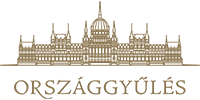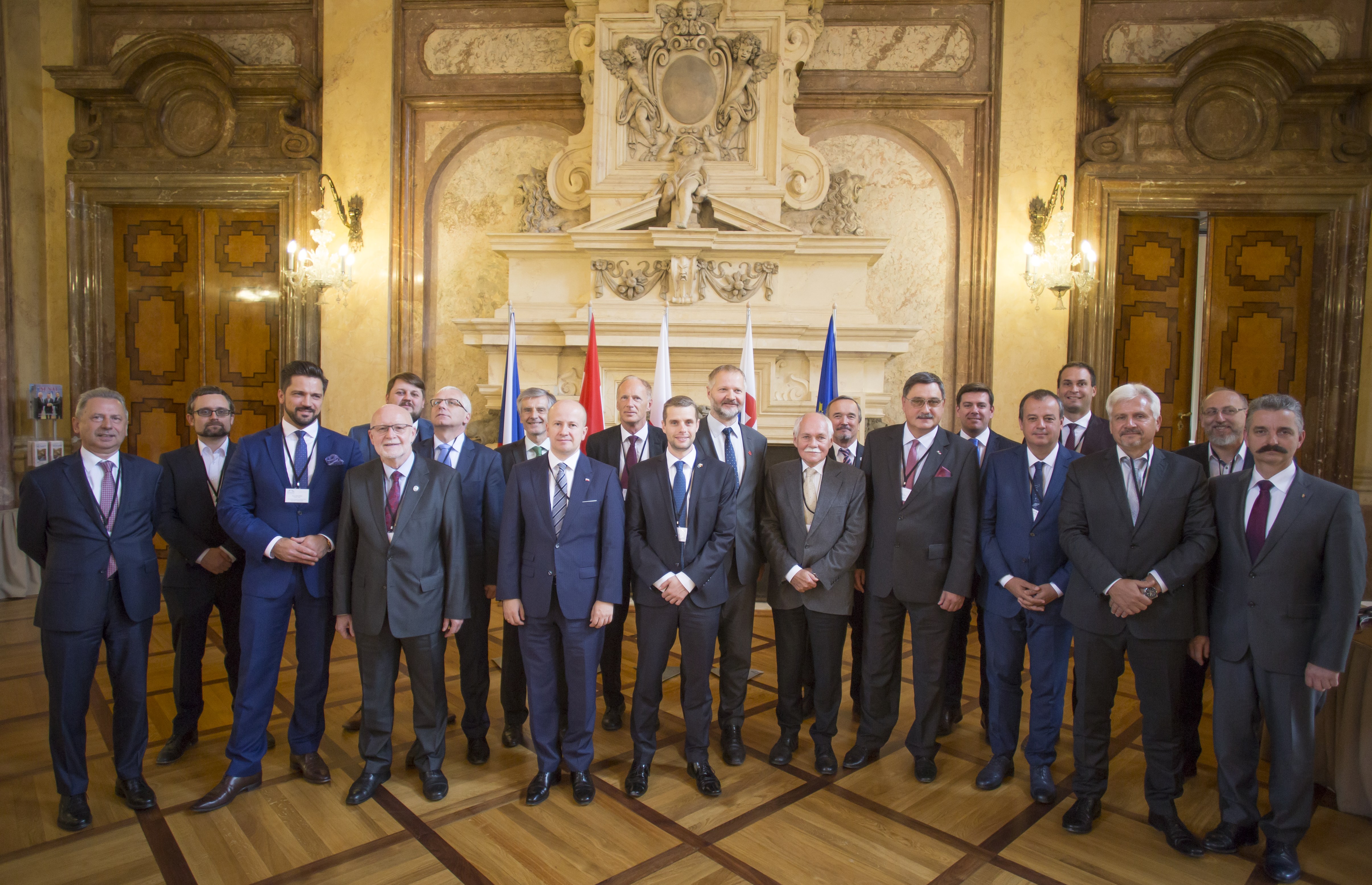
The Committee on Economics of the Hungarian National Assembly was represented by Vice-Chair Jenő Manninger and Committee Member Anita Potocskáné Kőrösi at the meeting, where all parliamentary chambers of the V4 countries were present. In his contribution, leader of the Hungarian delegation Jenő Manninger welcomed the continuity of the meetings of the V4 Economic Committees (referring to the meetings in Prague in 2016 and in Budapest in 2018). Concerning transport infrastructure, he emphasized that the development of the rail network is a key issue for Hungary and that high-speed rail lines—together with improving competitiveness and making social and economic progress—will play an important role in reaching the climate targets as well. Regarding the possible financial resources, he underlined that for Hungary it is very important to supplement relevant EU regulations, and it should be done by joint action of the V4 countries. In her contribution, Anita Potocskáné Kőrösi welcomed that one of the main priorities of the Czech V4 presidency is supporting research, development and innovation and praised the importance of cooperation and joint action of the V4 countries in this respect. She highlighted the significance of moving towards the digital economy, the Horizon Europe programme as a possible source of funding, and as for the countries with a lower innovation performance she underlined the importance of a minimum wage for researchers.
As host of the meeting, Chair of the Economic Committee of the Czech Chamber of Deputies Radim Fiala stressed the outstanding role of high-speed rail lines in transport infrastructures as well as the necessity of the cooperation of the V4 countries in the distribution of the EU funds. With regard to energetics, he stated that Czechs look at nuclear power as a clean source of energy that is necessary for the energy mix. On the topic of innovation, he underlined the importance of exchange of experience and added that the aim of the Czech Republic is to become one of the 20 most innovative countries of the world by 2030.
Chair of the Infrastructure Committee of the Polish Senate Jan Hamerski reported that they do trust in the implementation of high-speed rail lines, however, the specific technical questions will be answered by a study on possible implementation to be finalized in 2020.
Chair of the Slovak Economic Committee Jana Kiššová raised the importance of an innovative entrepreneurial environment, and pointed out that beyond increasing spending on innovation, monitoring of the results achieved should also be emphasized.

The presidency of the parliamentary cooperation of the Visegrád Group countries (V4) between July 2019 and July 2020 is held by the two chambers of the Czech Parliament. In this context, the Czech Chamber of Deputies, in cooperation with the Czech Senate, organised a joint committee meeting for the Defence Committees of the V4 parliaments on 7–8 January 2020. The Hungarian National Assembly was represented at the meeting by Miklós Simon, Deputy Chair of the Committee on Defence and Law Enforcement, with Miklós Boros, Hungary’s ambassador to Prague also attending the meeting. All the Defence or Security Committees of the Parliamentary Chambers of each V4 country were represented at the meeting (the Polish Sejm was represented at the expert level), the keynote addresses of which, were open to the press.
The three main themes of the event were V4 defence cooperation, joint procurements, and cyber defence and cyber security.
The meeting was opened by Jana Černochová, Chair of the Defence Committee of the Czech Chamber of Deputies, who in her opening speech recalled that the V4 cooperation will celebrate its 30th anniversary in February next year. She added that in recent years all countries have achieved a number of results individually, but they have always been the most effective when acting together. Among the speeches by the heads of delegations, Miklós Simon pointed out among other things with regards to defence policy, that the Visegrád Group cooperation is the most important regional forum for Hungary, providing an opportunity for regular debates and coordination of the various EU and NATO positions.
The progress made in the field of V4 defence cooperation and the defence priorities of the Czech V4 Presidency were presented by Radomír Jahoda, Deputy Minister for Defence Policy and Strategy at the Czech Ministry of Defence. Major general Jaromír Alan, Director of the Capability Planning Division of the Czech Army’s General Staff, then spoke about the V4 EU battlegroup, the possible reform thereof, the V4 JLSG HQ, the PESCO projects and the joint V4 trainings and exercises.
The second panel began with a presentation by Lubor Koudelka, Director of the Management and Support Department of the Armaments and Acquisition Division of the Czech Ministry of Defence, who shared a historical overview of joint procurement, the main reasons for the failure to cooperate and one of the main objectives of the Czech Presidency, the implementation of a small joint project.
In relation to the third item on the agenda, the delegations heard three lectures on the Czech Republic’s experience and approach to cyber defence and cyber security, the challenges and threats posed by cyber-attacks, and the possible solutions. Lukáš Kintr, Deputy Director of the National Cyber and Security Centre of the Czech National Cyber and Information Security Agency, explained that guaranteeing cyber security is the responsibility of the state, where prevention and understanding of potential threats are paramount. Parallel to this, cyber defence is the responsibility of military intelligence and the army, which was discussed in a presentation by Jan Beroun, Director of the Czech Military Intelligence. In the context of cyber defence, Mr. Beroun highlighted the lack of an exact definition and the importance of international cooperation. The third presentation was given by Michal Koudelka, Director of the Czech Security Information Service, who stressed that in addition to ongoing training, cooperation and mutual trust between the countries are essential in the fight against cyber-attacks.
In closing the meeting, the heads of delegations of the V4 defence committees signed a document containing the final conclusions of the event.
The European Affairs Committees of the parliaments of the Visegrad Countries held a meeting in Prague on 7–9 October 2018 at the invitation of Václav Hampl, Chairman of the Committee on EU Affairs of the Senate of the Czech Republic. The Committee on European Affairs of the Hungarian National Assembly was represented at the meeting by Chairman dr. Richárd Hörcsik and Vice-Chairman Zoltán Tessely. Following the practice — which has already become a tradition —, the European affairs committees of the V4 parliaments meet every six months, thus the parliament chamber hosting the event may be different from the parliament of the country holding the one-year V4 presidency.
The agenda of the meeting included the Energy Union and climate policy, as well as the report of the Task Force on Subsidiarity, Proportionality and “Doing Less More Efficiently”, established in late 2017 and led by the First Vice-President of the European Commission Frans Timmermans, and published on 10 July 2018.
With regard to the Energy Union and climate policy, Richárd Hörcsik reported that, the week before the meeting, the Hungarian National Assembly had held its debate on the second National Climate Change Strategy 2030 (also offering a prospective for the period up to 2050), which also reflected the objectives of the Paris Agreement. He emphasized that, for the purpose of mitigating climate change, Hungary took part in all the international and EU-level climate protection processes and fulfilled its obligations aimed at reducing greenhouse gas emissions and increasing CO2 sinks. He underlined that Hungary regarded the solar panel capacity increase as a priority, yet we could not do without nuclear energy either, since both resources were needed to ensure that 90 per cent of the country’s electricity generation be CO2-free by 2030.
Concerning this agenda item, Vice-Chairman Zoltán Tessely underlined the importance of the Member States’ national energy and climate plans, and declared that Hungary was committed to achieving the relevant EU targets. He explained that, besides energy efficiency and renewable energy, Hungary considered maintaining the country’s nuclear capacity as a key measure to achieve the objectives related to decarbonisation. The Vice-Chairman mentioned that it would be appropriate to identify the regional projects related to the Energy Union that could obtain EU funding after 2020, and made it clear that Hungary intended to maintain the state price regulation in terms of electricity.
The participants of the debate expressed their views primarily on energy policy and the challenges faced by their countries. The Polish party addressed the need for joint action against the Nord Stream 2 gas pipeline (Piotr Apel, Vice-Chairman of the European Affairs Committee of the Sejm of Poland), the issue of coal power plants based on new technologies and the legislative difficulties concerning the construction of wind turbines (Piotr Wach, Senator), while the Czech and Slovak parties referred to the need for nuclear power plants (Jan Skopeček, Czech MP, Martin Klus, Vice-Chairman of the European Affairs Committee of the National Council of the Slovak Republic).
Regarding the report of the task force on subsidiarity, Richárd Hörcsik expressed his view that the task force had been set up with at least 5 years’ delay, and the results achieved by it fell short of the expectations. He said that the Committee on European Affairs of the National Assembly of Hungary and the relevant government representative had discussed and evaluated the report of the task force in early October 2018. Although the Hungarian government did send written contributions to the task force, sadly, the document hardly contained any of the recommendations of the Member States.
The Chairman of the Hungarian committee underlined that the position of Hungary in terms of increasing the role of national parliaments in European affairs supported the introduction of the red card procedure, the extension of the 8-week deadline to 12 weeks, as well as taking into account the principle of proportionality when drafting reasoned opinions. Hungary does not accept the stealthy extension of the competences of the Union in any of the EU policies. We welcome the proposal of extending the 8-week deadline, included in the report, yet we regret that it had not defined any specific area that once again could fall under the competence of Member States, and we also regret that the plan of the so-called red card procedure has not been included, he said.
The rest of the speakers welcomed certain recommendations of the task force: a more flexible application by the European Commission of the 8-week deadline for issuing reasoned opinions and the extension of the current deadline to 12 weeks, upon a change of the Treaties.
At the end of the meeting, the participants unanimously adopted the final conclusions.
During the meeting, Chairman Richárd Hörcsik thanked the Czech MPs for the (short) resolution adopted by the Chamber of Deputies of the Czech Parliament on 2 October 2018, in which they had condemned the European Parliament for the so-called Sargentini report adopted in September.





